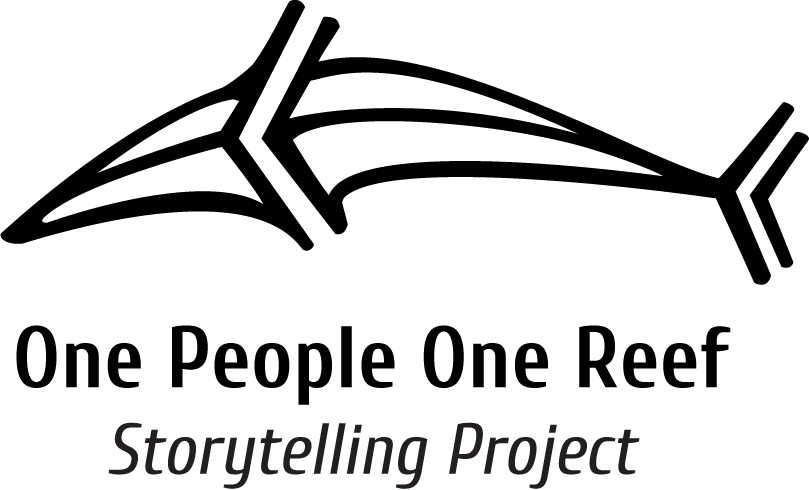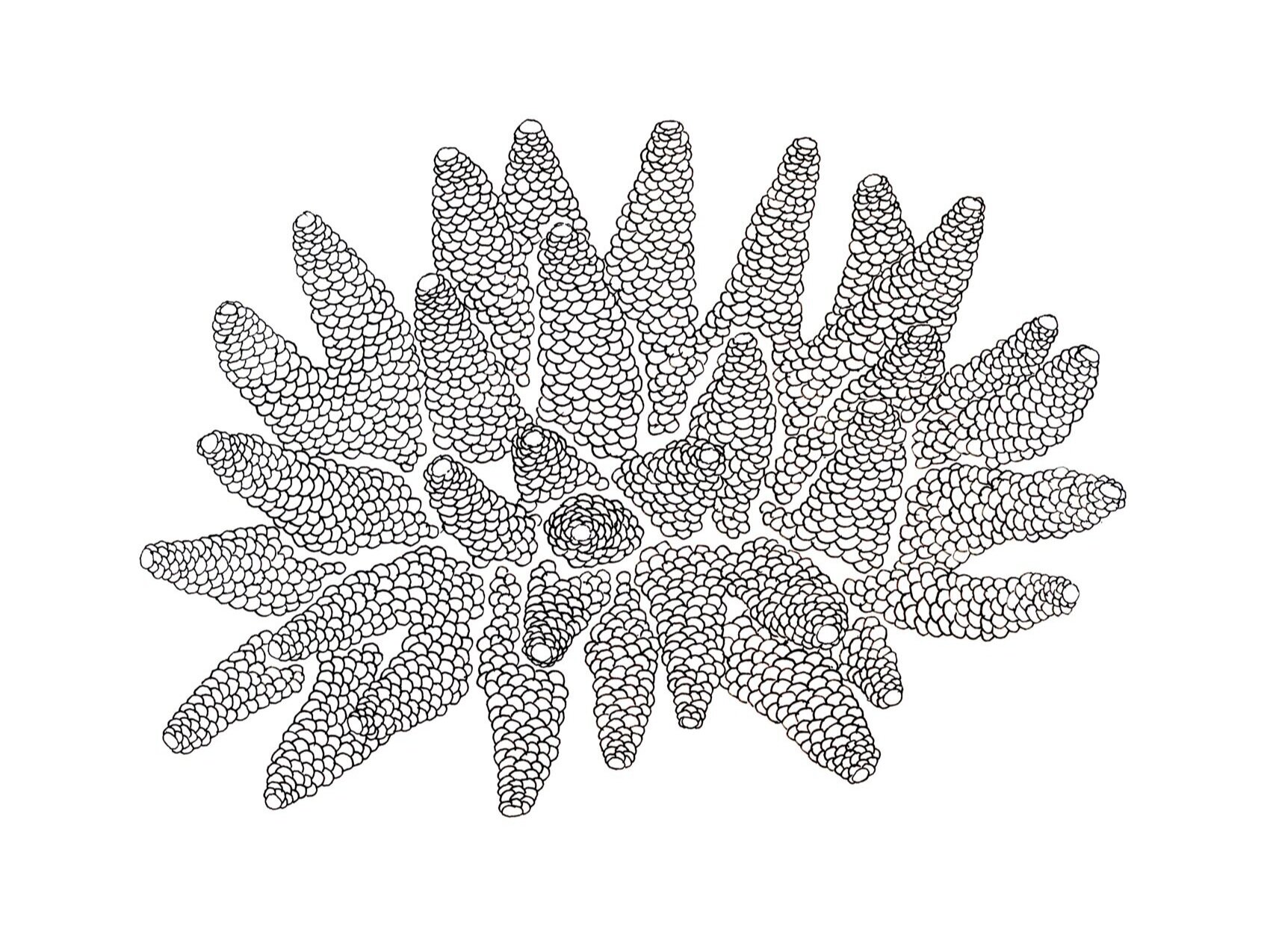Forbwaey
Told by Isaac Lengal, Asor Island, Ulithi Atoll
Fiyong le ila sihasi mo wol, Asor, le Isaac Lengal mele ye fiyongo ngal gich
Transcribed by John Rulmal (Junior Magul)
Forbwaey, grandson of Yolfad learns about navigation from Yalulwei, god of navigation. This story illustrates the dangers of voyaging by canoe, and the high level of skill, practice and respect required to do so successfully. On Ulithi, Falalop is the island of navigation, responsible for leading tribute voyages to Yap. These voyages enabled islanders to obtain resources that could not be found on a small atoll. Forbwaey's exclamation that “I will live! I am standing on coral” also points to the value of coral as the foundation of the islands themselves as well as the life-giving reefs that surround them.
English
Ulithian
If I may, I will tell another story. What happens when we don’t listen to reasoning? This is a story about the original navigators. Forbwaey and his brothers gathered to learn navigation. Their father was the father of navigation and our waterways.[1]
They learned and learned until they were ready. It was time for the sister to bring food for the brothers – well prepared taro cooked in coconut oil, which we call dipchig. Before eating, a special pot of the best parts of the meal was to be thrown into the ocean as an offering to the spirit Yalulwei. The sons did not do as instructed by their father. They ate their fill and gathered the trash and scraps – the empty coconut shell and the leaves used to cover the cooked taro. They threw all these into the ocean while saying, “Here’s your food, Yalulwei.” Then they went home.
This went on for a while until the navigation training was concluded. Now it was time to do the actual sailing. It was time for the navigators to discover if they could reach their destinations. During the trip with lots of people on board, they ran into a typhoon. The canoe sank, and everybody died except Forbwaey, who survived. He swam and swam until he gave up hope because there was no island in sight. Just before he sank, the water up to his nose, his feet touched something that felt like reef. He stood up and said “All right! I will live. I am standing on coral.” Then the coral disappeared, and he was swimming again. Once more he touched coral, but again it disappeared. This went on for some time.
Then a sand bar appeared. He struggled to reach the sand bar, but when he climbed onto it, the sand sank from beneath his feet. He climbed once more, only to fall back again. “Goodness why is this sand caving in?” he asked himself. All this time the spirit was living in the shelter beneath the canoe’s platform where people stay when a canoe is under sail. (There are two such platforms on a canoe. One is on the windward side and the other is on the leeward side.) Forbwaey staggered around the island. He was starving and thirsty. He finally found someone sitting in the shelter of the canoe’s platform, not facing out, but inward.
He saw a clamshell with a small amount of water inside, and a leaf with a little food on it. Just looking at the water and the food made Forbwaey hungrier and thirstier. He reached his fingers toward the food and water, but before he touched them he heard, “Ho ho! What were you planning on doing?” He wondered how it was possible that this figure was facing inward but could see him trying to steal his food behind him. Feeling sorry for Forbwaey, the spirit finally spoke to him. He asked Forbwaey what he wanted. Forbwaey said he wanted to eat because he was starving. The spirit told Forbwaey that he could not eat the food because it was so little and would not satisfy his hunger. The spirit told Forbwaey that he would find food at the end of the sand bar from which he just came.
“What? You mean the coconut branch and old leaves used to cover cooking pots?” asked Forbwaey.
“Wasn’t that the leftover scraps you always threw into the ocean for me?” asked the spirit. “That’s not what I eat.”
Then he allowed Forbwaey eat the little food he had there. Forbwaey ate and ate and ate, and when he looked, the same small amount remained. He drank and drank, but a small drop of water always remained.
The spirit told Forbwaey that he hadn’t learned enough navigation from the training. Now Forbwaey would learn from him, for his name meant “God of Sailing.” Forbwaey learned and learned until he was better than his brothers, even the oldest ones. To this day we hear tales about Forbwaey, but not his brothers. Okay, that is enough for now.
Chief Isaac ended his telling of Forbwaey with words that became the Afterword to this story collection.
[1] In Ulithi, Falalop is the navigation island, and the one to lead tribute voyages to Yap.
Ieye (Fiyong) le is wol mil chog mele sitema talnga yalol yarmat. Fiyongal rechokowe re chapi doh mele palu lal ted ke yach. Forbwaey idal ie yarmat la. Sew chog momol mo iyang. Momol la ngang ie depli mele chil moch lal chemai.
Sa tei mokwe wolbisil ie Farbaey resa kai Palu. Molwe temar mele ye chapi palu, palual lal ted ke. Ai reble kai palu ye la mol yai kai palu. Seral ngo mokwe wol mangear reble kakdi halar le mongaoi kowe chog mwomwai, le buloh kowe chog yedepchig we kamdidi. Wol mol molwe rebe mongoi ngo reble hasi mo sew raaw, hahasi mele hasa bidi habla pedaewai leted bo hal Yalulwei. Yong ir rete talnga yalol molwe temar. Reble rol mongoai fedal yerela mol yong rebele hasi mokwe pisil mokwe balbolol ie raw kowe mo pisial yamyem mo pangal pispisal raw kawe resa halifdi way (leted), “Ai halam ieya ho Yalulwei,” ngo retefal dah.
Seral ngo iewe, hasigsig ye-- rela graduate (mol irel Ferag Chob). Iewe ngo reble wai. Reble, “Hacheche Palu.” Ila mala idal mele be metamol yal be wai semal palu, hare rebe wiri fulu hare retowe wiri fulu. Resa wai, sa cholop yarmatal wa we, resa roloh. Sa lifdi ngalir sew lang iewe, sala moos loh wa we, ngo ye mes loh yarmatal we we, sa ie loh chog Farbey mele ye molow. Sa yaf fedal limdaw, Ye sa sor bo, “Maila bo ible hamulyayai loh, bo ible mes bo yekal loh ngo tor fului ngo.” Yodwe molwe sa mel bele dub loh molwe bodol, sa tugdah formel fal pechel, la kaladi, “Hale, yoch!” Sa sudah wol yoch, “Ai, halwe, isa molow molwe bo sew yoch ieye, isa sudiy uwol.” Sa loloh ye-- ngo wol temal loh yoch we sa wol yaf fedal. Fal fedow le iewe sangal.
Fal iewe se, ngo sa lahdoh sew piy. Sa yedamgil ngal piwe yela bidah, be harag dah wol piy we ngo ye mokdi. Harag dah ngo ye mokdi, “Hale, tewel ieye formel le ma mokdi chog piy le.” Yong ie iewe yepei luchochol piy fulu we le yemel fal sehay irae fal sew Ha’mwem. Rebe sor bo Ha’mwem ngo mokwe imal yarmat ichul wa. Yema mel wol rewe katab tang yang ngo sew ma mel rewe katab ngal yang ichul wal faluyach. Ha’mwem mele idal. Yepei fal ie Ha’mwem we imal.
Yesa derfedal la budoh sa melsel malit mo bwatbwat. Sala wiri le yemel fal ie Ha’mwem we le te telewai mo lal hatmal ie Ha’mwem we imal bo yefa tele long ielal. Sala su, sa yela kaladi lal sew pol doh le ye mel supui lol chael iyang. Mo sew chol irae le yemel suguteng mongoi leye pei iyang. Yekal ngali chog ngo sa kel doh yal koloh mo yal bwatbwat. Yong sa long molwe pol iyang, le be katele ngo, “Ye ye, hobe feday maka, ho?” Ifa sangal yeremtele ye teleloh lal hapil imw le ngo ibe memel ible pere meka hal ngo ie ye, “Ye ye”? Iewe mal bo sa fahoy, sa sa moch malili ngali, “Medae, mele? Hobe hat?”
“Ai, ibe mongoi meka bo isa mesil keloh.”
“Yak, taikof mongai ke bo hotowe mad iyang bo halsugfed chog. Halai ikowe iemel wol tabol piy we loboswe ho buloh mo iyang.”
“Hale, yamoem kowe, mo balmolal raw kowe ikla makla halai?”
“Te ikla ie mokwe homa peda wai bo halai? Ikla makla ie momongoi igla meka iete ma mongoi.”
Sa moch budoh hafuru ie mokwe, sa mongoi, mongoi ye halsugfed loh chog ngo lapal chog. Sa yul, yul chael we hal supey lal pol doh we ye-- la chu yal bwatbwat ngo ye poloh chog molwe supey le yemel lal pol doh we.
Bele moch kangalu bo lapal palu la hosa hola mo irel Ferag Chob we, “Ted lap ngalug. Budoh, igla mele iebele moch kangalug.”
Iela fal iemolwe idal, “Yalulwei.” le ila mala Yalusul Wei. Sa moch budoh kai palu mo lobos we yela salap loh yarmat we tangir pangal mokwe wol bisil we remol yarmat. Iewe rael ka si rongrong fiyongal Forbwaey sita rongrong kofar ikla sibis. Yai iewe, sa iewe mo.


